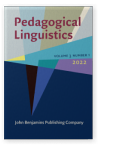Vol. 3:1 (2022) ► pp.29–56
The linguistics of reading literature
A pragmatic account of ‘aesthetic reading’ of literary texts and its didactic implications
In this paper, I attempt a bridge between linguistics, in particular text pragmatics, and school reading of literary texts. I propose a linguistic model of these peculiarities of the reading of literary texts, especially poetry, that have been called ‘aesthetic reading’, arguing that a linguistically founded basis is what is lacking for school engagement with (not only literary) texts. In the last years there has been extensive research on the linguistics-literature interface; however, what is surprisingly still missing, is a consistent linguistic model of literary reading. In this paper, I propose such a model and show that ‘aesthetic reading’ involves a distinct reading strategy that can be captured in terms of text-world-models and the differentiation between coherence and text sense displaying. Consciously reading poetry amounts, linguistically seen, to a close reading (i) especially focusing marked expressions, i.e., deviations from phonological, morphological, syntactic, semantic and textpragmatic routines, (ii) maintaining of unsolved ambiguities and thus (iii) generating an array of ‘authorized inferences’ that can be productively used for a principled plurality of interpretations. I specify this proposal and illustrate it with two cases of marked pronominal reference, arguing that my proposal has some important implications that make it particularly suitable for school context.
Article outline
- 1.Introduction
- 2.Preliminaries: Text understanding in general and literary reading
- 2.1General assumptions on text understanding
- 2.2General assumptions on literary reading
- 3.Proposal: Two idealized overall reading strategies
- 3.1Everyday strategy of reading
- 3.2Strategy for aesthetic reading
- 4.Literary reading and pronominal reference in lyrical texts
- 4.1Referential coherence and cohesion: personal pronouns
- 4.2Using the model: Two examples of meaningful departures from routine
- 4.2.1Reference routine one: Avoid ambiguity
- 4.2.2Reference routine two: Resolve personal pronouns to topics
- 5.Looking ahead: Didactic implications of the model
- First implication: Reading as TWM construal for all texts
- Ad (1)
- Ad (2)
- Second implication: Revising the direction of the text analysis with literary texts
- Third implication: Integrative grammar teaching is necessary and possible
- Fourth implication: Avoiding ‘what the author wants to tell us’ or ‘nutcracker hermeneutics’
- Acknowledgements
- Notes
-
References
